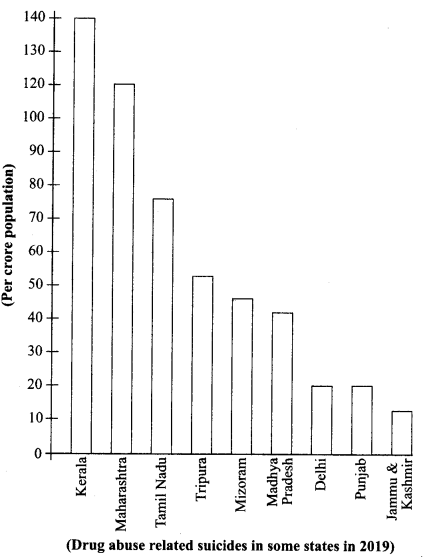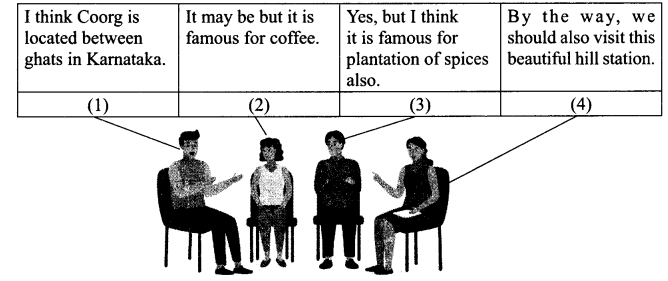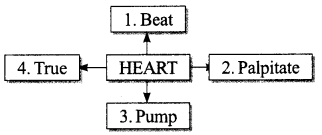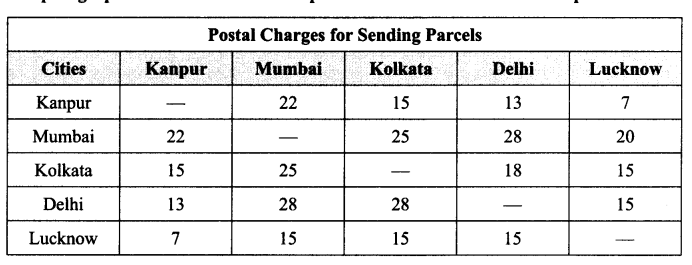Students can access the CBSE Sample Papers for Class 10 English with Solutions and marking scheme Set 4 will help students in understanding the difficulty level of the exam.
CBSE Sample Papers for Class 10 English Set 4 with Practice
Time: 3 Hours
Maximum Marks: 80
General Instructions:
1. This paper is divided into two parts: A and B. All questions are compulsory.
2. Separate instructions are given with each section and question, wherever necessary. Read these instructions very carefully and follow them.
3. Do not exceed the prescribed word limit while answering the questions.
Part-A
Multiple Choice Questions (40 Marks)
Reading (20 Marks)
Question 1.
Read the passage given below. (10 Marks)
1. I was the last child of a small-time government servant, in a family of five brothers. My very earliest memory of my father is as that of a district employment officer in Koraput, Orissa. It was and remains as back of beyond as you can imagine. There was no electricity; no primary school nearby and water did not flow out of a tap. As a result, I did not go to school until the age of eight; I was home-schooled.
2. My father used to get transferred every year. The family belongings fit into the back of a jeep, so the family moved from place to place; without any trouble, my mother would set up an establishment and get us going. Raised by a widow who had come as refugee from the then East Bengal, she was matriculate when she married my father. My parents set the foundation of my life and the value system which makes me what I am today and largely defines what success means to me.
3. My father had been given a jeep by the government. There was no garage in the office, so the jeep was parked in our house. My father refused to use it to commute to the office. He told us that the jeep was an expensive resource given by the government; it was not ‘his jeep’ but the government’s. Insisting that he would use it only to tour the interiors, he would walk to his office on normal days. He also made sure that we sat in the jeep only when it was stationary.
4. That was our early childhood lesson in governance, a lesson that corporate managers learn the hard way. Indeed, some never do.
5. The jeep’s driver was treated with respect like any other member of my father’s office. As small children, we were taught not to call him by his name. We had to use the suffix ‘dada’ whenever we were to refer to him in public or in private. When I grew up to own a car, a driver by the name of Raju was appointed. I repeated the lesson to my two small daughters. They have, as a result, grown up to call Raju, ‘Raju Uncle’ – very different from many of their friends who refer to their family drivers as ‘my driver’.
6. When I hear that term from a school or college-going person, I cringe. To me, the lesson was significant: You treat small people with more respect than big people. It is more important to respect your subordinates than your superiors.
On the basis of your understanding of the passage, answer any ten questions from the twelve that follow. (10 × 1 = 10)
(i) The narrator did not go to school until the age of eight because:
(a) there was no electricity in his village
(b) there was no primary school nearby his home
(c) water did not flow out of a tap
(d) All of these
Answer:
(d) All of these
(ii) The narrator’s family moved from place to place every year because:
(a) they did not get as good school as he desired
(b) they did not get as good home as he desired
(c) of lack of drinking water
(d) his father used to get transferred every year
Answer:
(d) his father used to get transferred every year
(iii) The narrator’s father parked the jeep of his office in his own house as:
(a) he has too much spare space in his house
(b) it was the order of his senior
(c) he needed that car even in his house
(d) there was no garage in the office
Answer:
(b) it was the order of his senior
(iv) According to the narrator’s father, the jeep given by government is:
(a) a luxurious resource
(b) a cheap resource
(c) a cause for dullness
(d) an expensive resource
Answer:
(d) an expensive resource
(v) ‘As small children, we were taught not to call him by his name.’ Here ‘his name’ refers to:
(a) the narrator’s name
(b) the narrator’s father’s name
(c) the narrator’s teacher’s name
(d) the driver of the narrator’s father
Answer:
(d) the driver of the narrator’s father
(vi) Choose the option that best captures the central idea of the passage.
(a) The corporate sector
(b) The life of a government employee
(c) The hurdles in the life of a government employee
(d) The life of a servant
Answer:
(b) The life of a government employee
(vii) Which of the characteristics are apt about the writer in the following context: “We had to use the suffix ‘dada’ whenever we were to refer to him in public or in private.”
1. Soft-hearted
2. Kind
3. Disciplined
4. Timid
5. Obedient
6. Patient
(a) 1 and 4
(b) 3 and 5
(c) 4 and 5
(d) 3 and 6
Answer:
(b) 3 and 5
(viii) Select the option that makes the correct use of ‘significant’, as used in the passage.
(a) The results of the experiment are not statistically …………………..
(b) The application forms have now been ………………….
(c) The number of people are ……………… increased.
(d) The food was ………………. better like her words.
Answer:
(a) The results of the experiment are not statistically …………………..
(ix) Choose the option that correctly states the two meanings of ‘commute’.
1. To travel regularly by bus etc. to work
2. Connected with studying things
3. To force somebody to do something
4. To replace one punishment with another
(a) 1 and 3
(b) 1 and 4
(c) 2 and 4
(d) 3 and 4
Answer:
(b) 1 and 4
(x) The author explains the importance of discipline and kindness using the example of:
(a) the government job of his father
(b) his home-schooling
(c) his life
(d) the life of a driver
Answer:
(a) the government job of his father
(xi) What is the message conveyed in the last paragraph of the passage?
(a) Respect others
(b) Be generous
(c) Be kind to everyone
(d) Respect your subordinates
Answer:
(d) Respect your subordinates
(xii) The narrator learnt a lesson that:
(a) big people should be treated with more respect than small people
(b) small people should be treated with more respect than big people
(c) Both (a) and (b)
(d) Neither (a) nor (b)
Answer:
(b) small people should be treated with more respect than big people
Question 2.
Read the passage given below. (10 Marks)
The epidemic of drug abuse in young generation has assumed alarming dimensions in India. Changing cultural values, increasing economic stress and dwindling supportive bonds are leading to initiation of drug abuse.
Drug addiction causes immense human distress and the illegal production and distribution of drugs have spawned crime and violence worldwide. June 26 is celebrated as international day against Drug Abuse. It is an exercise undertaken by the world community to sensitize the people in general and the youth in particular to the menace of drugs.
The pattern of drug abuse in India has undergone changes over the years. Use of drugs like charas, ganja, and opium was a tradition in some places of India, where they were mainly used for ritualistic purposes.
According to a UN report, one million heroin addicts are registered in India, and unofficially there are as many as five million. Inhalation of heroin alone has given way to intravenous drug use that too in combination with other sedatives and painkillers. This has increased the intensity of the effect, hastened the process of addiction and complicated the process of recovery.
A large number of people commit suicide due to drug/alcohol/addiction. Drug abuse is a complex phenomenon, which has various social, cultural, biological, geographical, historical and economic aspects. The disintegration of the old joint family system, absence of parental love and care in modem families where both parents are working, decline of old religious and moral values etc. lead to a rise in the number of drug addicts who take drugs to escape hard realities of life.
Drug abuse is primarily due to the nature of the drug abused, the personality of the individual and the addict’s immediate environment. The processes of industrialisation, urbanisation and migration have led to loosening of the traditional methods of social control rendering individual vulnerable to the stresses and strains of modem life. Drug abuse caused a detrimental impact on the society.
It has led to increase in the crime rate. According to the World Health Organisation report 2002, 8.9% of the total burden of disease is due to use of psychoactive substances. Adolescent drug abuse is one of the major areas of concern in adolescent and young people’s behaviour. It is estimated that in India, by the time most boys reach ninth grade, about 40% of them have tried at least one of the substance of abuse nature.

On the basis of your understanding of the passage, answer any ten questions from the twelve that follow. (10 × 1 = 10)
(i) What are the factors that cause drug abuse in young generation?
(a) Changing cultural values
(b) Increasing economic stress
(c) Dwindling supportive bonds
(d) All of these
Answer:
(d) All of these
(ii) What is/are the adverse impact(s) of drug addiction?
(a) Enormous human distress
(b) Illegal production of drugs
(c) Illegal distribution of drugs
(d) All of these
Answer:
(d) All of these
(iii) According to the graph, how many people out of one crore committed suicide due to drug addiction in Maharashtra in 2019?
(a) Nearly 142
(b) Nearly 122
(c) Nearly 132
(d) Nearly 112
Answer:
(b) Nearly 122
(iv) According to a UN report, how many heroin addicts are registered in India?
(a) One lakh
(b) Ten lakh
(c) One crore
(d) Ten crore
Answer:
(b) Ten lakh
(v) Based on your understanding of the passage, choose the option that lists the causes of the rise in the number of drug addicts.
1. Disintegration of joint family system
2. Absence of parental love
3. Decline of old religious and moral values
4. Absence of enough money
5. Stress in modem life
(a) 1,2 and 4
(b) 2, 3 and 5
(c) 2, 3 and 4
(d) 1,2 and 3
Answer:
(d) 1,2 and 3
(vi) As per the graph, how many people out of one crore committed suicide due to drug addiction in Mizoram in 2019?
(a) Nearly 76
(b) Nearly 52
(c) Nearly 45
(d) Nearly 17
Answer:
(c) Nearly 45
(vii) In the line “………………… drugs have spawned crime,” the word ‘spawned’ DOES NOT refer to:
(a) give a rise to something
(b) follow an old ritual
(c) provoke someone/something
(d) trigger a particular action or situation
Answer:
(b) follow an old ritual
(viii) As per the WHO, what percentage of the total burden of disease is due to the use of drugs?
(a) 10%
(b) 5.6%
(c) 8.9%
(d) 10.2%
Answer:
(c) 8.9%
(ix) Choose the option that lists the correct answers for the following:
1. Peter, a seventeen-year-old student believes that drugs can help to improve his focus in school. What kind of a person is Peter?
2. Mr Paul is a sports-person. He often consumes drugs to boost his performance. What kind of a person is Mr Paul?
(a) 1 is a drug addict and 2 is not a drug addict
(b) 1 is not a drug addict and 2 is also not a drug addict
(c) 1 is a drug addict and 2 may/may not be a drug addict
(d) 1 may/may not be a drug addict and 2 often consumes drugs
Answer:
(d) 1 may/may not be a drug addict and 2 often consumes drugs
(x) How many people, as per the graph, out of one crore committed suicide due to drug addiction in Punjab in 2019?
(a) About 53
(b) About 17
(c) About 46
(d) About 30
Answer:
(b) About 17
(xi) Use of which of these drugs was a tradition in some places of India?
(a) Charas
(b) Ganja
(c) Opium
(d) All of these
Answer:
(d) All of these
(xii) Choose the option that lists statement that is NOT TRUE.
(a) Drugs are consumed to escape hard realities of life.
(b) Drug abuse is a major concern in young people’s behaviour.
(c) Around one million heroin addicts are unofficially registered in India,
(d) Drug addiction encourages suicide.
Answer:
(c) Around one million heroin addicts are unofficially registered in India,
Literature (10 Marks)
Question 3.
Read the extracts given below and attempt any one by answering the questions that follow. (5 × 1 = 5)
A. Coorg, or Kodagu, the smallest district of Karnataka, is home to evergreen rainforests, spices and coffee plantations. Evergreen rainforests cover thirty percent of this district. During the monsoons, it pours enough to keep many visitors away. The season of joy commences from September and continues till March. The weather is perfect, with some showers thrown in for good measure. The air breathes of invigorating coffee. Coffee estates and colonial bungalows stand tucked under tree canopies in prime corners.
(i) What is Coorg famous for?
(a) Plantations of coffee
(b) Plantations of spices
(c) Hill station
(d) All of these
Answer:
(d) All of these
(ii) Choose the option that lists the set of statements that are NOT TRUE according to the given extract.
1. Coorg is a desert area.
2. There are abundant rainforests in Coorg.
3. The suitable time to visit Coorg is from September to March.
4. Coorg is one of the biggest districts of Karnataka.
5. The air at Coorg is filled with fragrance.
(a) 1 and 2
(b) 3 and 4
(c) 1 and 4
(d) 2 and 4
Answer:
(c) 1 and 4
(iii) The air at Coorg is filled with strong fragrances due to:
(a) abundant spice plantation
(b) abundant coffee plantation
(c) hilly area
(d) no pollution
Answer:
(b) abundant coffee plantation
(iv) Which word does ‘tucked’ NOT correspond to?
(a) Sticked
(b) Thrusted
(c) Drawn
(d) Inserted
Answer:
(c) Drawn
(v) Pick the option that correctly classifies fact/s (F) and opinion/s (O) of the students below.

(a) F- 1,2 and 0-3,4
(b) F – 2, 3 and 0-1,4
(c) F- 1,4 and 0-2, 3
(d) F – 3, 4 and O – 1, 2
Answer:
(b) F – 2, 3 and 0-1,4
B. He stretched out his hand towards me. There was a fifty-rupee note between his fingers. My heart sank. I thought I had been discovered.
“I made some money yesterday,” he explained. “Now you’ll be paid regularly.”
My spirits rose. But when I took the note, I saw it was still wet from the night’s rain.
(i) Anil had in his hand a:
(a) a fifty rupee note
(b) a twenty rupee note
(c) a ten rupee not
(d) a five rupee note
Answer:
(a) a fifty rupee note
(ii) ‘My heart sank’ says Hari Singh. He thought:
(a) he would have to make the meal again
(b) his theft had been discovered
(c) he would have to go out in the rain to buy vegetables
(d) he would be sent off
Answer:
(b) his theft had been discovered
(iii) Why did he come back to Anil?
(a) He wanted to return the money
(b) It was raining heavily outside
(c) He had missed the 10:30 Lucknow Express
(d) He did not want to break Anil’s trust
Answer:
(d) He did not want to break Anil’s trust
(iv) What opportunity he would have lost if he had left Anil forever?
(a) To cook good
(b) To watch wrestling
(c) To make money from daily shopping
(d) To become an educated man
Answer:
(d) To become an educated man
(v) The extract uses the phrase, ‘heart sank’. Which of these expressions is incorrect with respect to the word ‘heart’ ?

(a) Option 1
(b) Option 2
(c) Option 3
(d) Option 4
Answer:
(d) Option 4
Question 4.
Read the extracts given below and attempt any one by answering the questions that follow. (5 × 1 = 5)
A. Not one is dissatisfied, not one is demented with the mania of owning things,
Not one kneels to another, nor to his kind that lived thousands of years ago,
Not one is respectable or unhappy over the whole earth
So they show their relations to me and I accept them
They bring me tokens of myself, they evince them plainly in their possession.
(i) According to the poet, animals:
(a) are not satisfied like humans
(b) are satisfied with whatever they have
(c) run behind world things
(d) fight with one another for worldly things
Answer:
(b) are satisfied with whatever they have
(ii) Here the poet says that he has never seen any animals:
(a) showing devotion to anyone
(b) bowing down in front of the person
(c) showing devotion towards God
(d) All of these
Answer:
(d) All of these
(iii) In showing relations with other animals, animals are:
(a) very dishonest
(b) very honest
(c) very cruel
(d) very selfish
Answer:
(b) very honest
(iv) The poet of the poem to which this stanza belongs, is:
(a) Robert Frost
(b) Carl Sandburg
(c) William Butter Yeats
(d) Walt Whitman
Answer:
(d) Walt Whitman
(v) ‘They bring me tokens of myself. ’ Which poetic device is used in this line?
(a) Repetition
(b) Assonance
(c) Metaphor
(d) Anaphora
Answer:
(c) Metaphor
B. Suddenly, suddenly they heard a nasty sound,
And Mustard growled, and they all looked around.
Meowch! cried Ink, and ooh! cried Belinda,
For there was a pirate, climbing in the winda.
But up jumped Custard, snorting like an engine,
Clashed his tails like irons in a dungeon,
With a clatter and a clank and a jangling squirm
He went at the pirate like a robin at a worm.
(i) Suddenly they heard a sound of someone:
(a) talking with each other
(b) singing a song
(c) laughing
(d) entering the house
Answer:
(d) entering the house
(ii) What is the rhyme scheme of the given stanza?
(a) abed; abed
(b) aaab; aaab
(c) aebe; aebe
(d) aabb; aabb
Answer:
(d) aabb; aabb
(iii) What were their reactions upon seeing the pirate?
(a) The dog barked at him
(b) The kitten meowed to him
(c) Both (a) and (b)
(d) Neither (a) nor (b)
Answer:
(c) Both (a) and (b)
(iv) Belinda cried ‘ooh!’ because:
(a) she was scared of the pirate
(b) ink cried ‘Meowch!’
(c) all of her pet animals were scared of the pirate
(d) a pirate was climbing the window
Answer:
(c) all of her pet animals were scared of the pirate
(v) The word ‘nasty’ DOES NOT have a meaning similar to:
(a) disgusting
(b) awful
(c) unpleasant
(d) agreeable
Answer:
(d) agreeable
Grammar (10 Marks)
Question 5.
Choose the correct options to fill in the blanks to complete the note about fortune. (3 × 1=3)
It is generally believed that fortune (i) ……………… a big role in the life of an individual. If he
is favoured by the goddess of destiny, he may have all the good things in life. But if fortune
frowns upon him, he (ii) ……………….. completely. However, you should not forget that without studying hard you (iii) ……………. with success.
(i) (a) have played
(b) has play
(c) plays
(d) is playing
Answer:
(c) plays
(ii) (a) may be destroy
(b) may destroy
(c) may be destroyed
(d) mayn’t be destroyed
Answer:
(c) may be destroyed
(iii) (a) will crown
(b) will be crowned
(c) will be crowning
(d) will crowned
Answer:
(b) will be crowned
Question 6.
Choose the correct options to fill in the blanks to complete the doctor’s narration.(3 × 1 = 3)

I found a Covid-19 patient waiting in the clinic. I (i) ……………….. sitting there. The Covid-19 patient(ii) …………………… suffering from high fever and having a running nose. I said that he thought he was Covid-19 affected. He shocked me by saying that he had developed the same symptoms. He further (iii) ……………….. afraid of him.
(i) (a) ask him that why
(b) asked him why he was
(c) told him why he is
(d) questioned him why he is
Answer:
(b) asked him why he was
(ii) (a) suggest that he has been
(b) obeyed that he had been
(c) replied that he had been
(d) refused that he had been
Answer:
(c) replied that he had been
(iii) (a) enquired if I was
(b) enquired if he is
(c) ask whether I was
(d) added if he was
Answer:
(a) enquired if I was
Question 7.
Fill in the blanks by choosing the correct options for any four of the six sentences given below. (4 × 1 = 4)
(i) He who ……………… solution of the problem will lead the team.
(a) bring
(b) brings
(c) shall bring
(d) have bring
Answer:
(b) brings
(ii) The Indian team is very strong. It ……………. win the match.
(a) ought to
(b) may
(c) can
(d) will
Answer:
(a) ought to
(iii) Ravi had to put in …………….. hard work to come out with flying colours in the board examination.
(a) few
(b) several
(c) much
(d) many
Answer:
(c) much
(iv) When one of the candidates ……………… caught copying, the others became cautious.
(a) is
(b) was
(c) were
(d) are
Answer:
(c) were
(v) Nobody ………………. ask him about his intentions.
(a) dare
(b) dares
(c) daring
(d) dared
Answer:
(d) dared
(vi) One goes to …………….. university to receive education so that he could become good citizen.
(a) a, the
(b) the, a
(c) a, a
(d) the, the
Answer:
(b) the, a
Part-B – Subjective Questions (40 Marks)
Writing (10 Marks)
Question 8.
Attempt any one of the following in 100-120 words. (5 Marks)
A. Write a letter to the Editor of a local newspaper complaining about employing minor children both boys and girls as full domestic help is a common feature, also advocating the need to stop such practice which deprives the children of their basic rights. You are Kunwar/Shubhangi, B-36, Mayur Vihar, Phase-II, Delhi.
B. You are Sakshi/Saksham, a customer of Excitel Broadband. Write a letter to the Customer Care Department, Excite! regarding the poor service of internet connection. You are a resident of 485, Ram Nagar, Shahdara.
Question 9.
Attempt any one of the following in 100-120 words. (5 Marks)
A. Read the table given below that describes postal charges among five main cities of India, Kanpur, Mumbai, Kolkata, Delhi and Lucknow. Write a critical and analytic description in a paragraph of 100-120 words. Compare and contrast them wherever possible.

B. The given report presented by Times News Network illustrates the average salaries of India Inc. to its employees for 2020. Summarise by writing an analytic paragraph (100-120 words) highlighting the main features and details. Compare wherever relevant.

Literature (30 Marks)
Question 10.
Answer any two questions in 20-30 words each, from (A) and (B) respectively. (4 × 2 = 8)
A. (any two) (2 × 2 = 4)
(i) After achieving political emancipation, what does Mandela want to do in South Africa?
(ii) How have humans dropped those ‘tokens’ which are plainly in the ‘possession’ of animals?
(iii) Why is Chubukov surprised at Lomov’s wearing of a formal dress when he comes to meet him?
B. (any two) (2 × 2 = 4)
(i) How did Griffin succeed in becoming invisible? What was the result of his experiments?
(ii) How did Mr and Mrs Loisel replace the lost necklace and return it to Mme Forestier?
(iii) How did Ramlal react after the ceremony ended with the departure of the bridegroom alone?
Question 11.
Answer any two questions in 40-50 words each, from (A) and (B) respectively. (4 × 3 = 12)
A. (any two) (2 × 3 = 6)
(i) Who received Lencho’s letter? Why did he answer it?
(ii) How did the young seagull’s mother teach him flying?
(iii) What is the story about the origin of the people of Coorg?
B. (any two) (2 × 3 = 6)
(i) Why was it difficult for Hari to rob Anil?
(ii) How did Hari Singh forget about his education in the excitement of his theft? What did he think about it in the end?
(iii) How did Richard Ebright excite the scientific world at the age of twenty two?
Question 12.
Answer any one of the following in 100-120 words. (5 Marks)
A. Do you agree that Anne Frank was far more intelligent, mature and witty than her age? Give a reasoned answer.
B. Mention two contrasting views regarding the end of the world as forecasted in the poem “Fire and Ice”.
Question 13.
Answer any one of the following in 100-120 words. (5 Marks)
A. The course of the Loisel’s life changed due to the necklace. Comment.
B. Anil’s large-heartedness transforms Hari Singh completely. Comment.